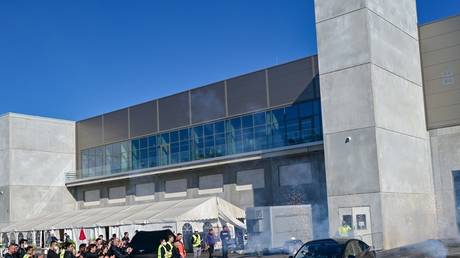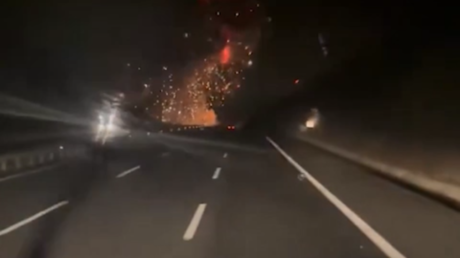
The electrical car factory in Germany has stopped operations due to a suspected arson attack
A shadowy left-wing group has said it was behind the suspected arson that prompted the shutdown of a major Tesla plant near Berlin. The authorities and Tesla owner Elon Musk have condemned the actions of “terrorists.”
Tesla’s Gigafactory Berlin-Brandenburg in Gruenheide was evacuated on Tuesday when a nearby electricity pylon caught fire, the authorities and the company said. The blaze did not spread to the factory, but triggered a power outage that ground the production to a halt. The police said that they are investigating the incident as a possible arson.
The far-left Vulcan Group (Vulkangruppe) has claimed responsibility for the fire in a letter sent to German media, citing “the conditions of extreme exploitation” at the plant and calling for “a complete destruction of the Gigafactory.” This group and organizations with similar names have been claiming responsibility for arsons in Germany since 2011, according to authorities. Not much is known about the group’s members.
Musk lashed out at the likely perpetrators on social media. “These are either the dumbest eco-terrorists on Earth or they’re puppets of those who don’t have good environmental goals,” Musk wrote on X (formerly Twitter). He added in German that it was “extremely dumb” to target the production of electric cars rather than vehicles that run on fossil fuel.
Brandenburg Minister-President Dietmar Woidke condemned the incident as “a serious attack on our critical infrastructure with consequences for thousands of people and many small and large businesses in our state.” He added that such attacks are “a form of terrorism.” Brandenburg Interior Minister Michael Stuebgen, meanwhile, described the suspected attack as a “perfidious arson.”
Reuters cited Tesla as saying that the outage left 1,000 vehicles unfinished on Tuesday alone.
Opened in 2022, the Brandenburg plant became Tesla’s first manufacturing site in Europe. The company announced last year that it had reached the production level of 5,000 cars per week.




